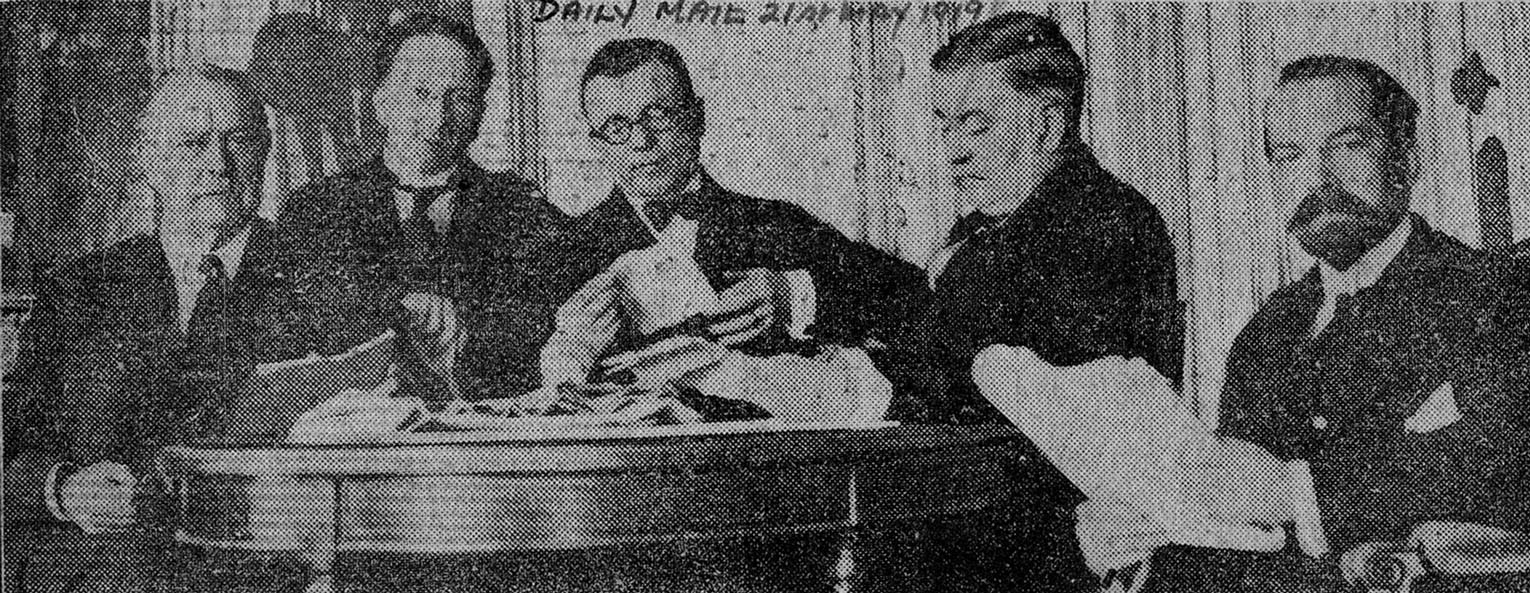American Commission delivers damning report on British policy in Ireland
Dublin, 17 June 1919 - The report of the American Commission on Irish Independence has, today, finally been released for Irish audiences, a week after its core details were published in the British press. The delay in publication in Ireland is down to the actions of the censor to whom the report was submitted earlier this month, on 8 June. Copies have also been delivered to David Lloyd George, Woodrow Wilson and Robert Lansing, the U.S. Secretary of State.
The report was prepared by Frank Walsh, Edward F. Dunne and Michael J. Ryan, Irish-American delegates, appointed by the Irish Race Convention. It offers a damning indictment of the British administration in Ireland. In the cover letter to President Wilson, the authors have urged that, in light of the ‘serious and critical situation’ exposed in the report, the President not only gives its content ‘careful consideration’, but presents it to the five great powers at the Peace Conference.
The report details the extent to which Ireland has become militarised. It states that the ‘army of occupation’ numbers considerably more than 100,000 soldiers and it continues to grow. These troops, it is stated, are equipped with lorries, armoured cars, tanks, machine guns, bombing planes, light and heavy artillery and they are supplemented by 15,000 members of the Royal Irish Constabulary who also armed with rifles, as well as small firearms.

Cartoon on the pressure put on Wilson by Congress to make Ireland's claim at the Paris Peace Conference (Image: Sunday Independent, 15 June 1919)
On the advice of Éamon de Valera, the commission delegates also visited Mountjoy Prison in Dublin which holds a large number of political prisoners.
The cells in which the prisoners – ‘men of the highest position’ – are held are described as ‘cages’ similar to those used for ‘wild animals in the larger zoological gardens, such as Lincoln Park and the Bronx in the U.S.’ Even so, conditions were ‘not as bad’ as the brutality experienced in many of the other Irish jails, they said.
Spotted during the delegation’s visit was Piaras Béaslaí, a journalist and one of the political prisoners. Béaslaí was being bundled through a doorway by a prison guard when he saw the delegates and let out a shout: ‘I want to call your attention to the fact that this brute who has me in charge is about to punish me for saying ‘Long live the Republic’.’
As well as documenting conditions, the commissioners make specific allegations, the most serious of which relates to the death of civilians at the hands of soldiers and the police.
The report states that ‘within the past few months at least 10 citizens have been killed by soldiers and constables under circumstances in which, in the majority of cases, coroners’ juries found to be wilful murder under the laws of England, the last man having been murdered in this way less than one month ago, the perpetrators going unpunished; hundreds of men and women have been confined for months in the vilest prisons without any charges being preferred against them. At least five men have died as a result of atrocities perpetrated upon them while in prison, the post mortem examinations in some of the cases disclosing marks of violence upon the bodies of the victims.’

Cover of the report published by the Irish-American delegation on the condition of Ireland. View the report in full on the Villanova University Digital Library here (Image: Digital Library@Villanova University)
More generally, the commission declared that the ‘right of privacy no longer exists in Ireland. The houses of the people are constantly being invaded by armed men, and the occupants, including women and young children, cruelly beaten and otherwise maltreated. The children of suspected republicans, many of tender years, are kidnapped and their parents kept in ignorance of their whereabouts for weeks.’
Despite the seriousness of the charges contained within the report and the stated wishes of the Irish-American delegates, President Wilson has already made clear that the U.S. representatives at the Peace Conference would not take up the case of Ireland at the Paris talks.
President Wilson did, however, state that he and others could assist unofficially to support the interests of Ireland.
The report on Irish conditions has been refuted by the Chief Secretary and denounced by the Irish Times as being ‘so fantastic as to require no refutation; the majority are sheer falsehoods; they all bear the mark of bigoted fanaticism. No sane Irishman could believe the grotesque tale of atrocities and horrors which the Americans’ statement unfolds. We are certain that no sane American will be deceived by it.’
Moreover, the Irish Times has described the report as a deliberate attempt to sow discord between the British and U.S. administrations and its circulation in America, where its authors are believed to enjoy a ‘reputation for integrity and uprightness’, is condemned.
[Editor's note: This is an article from Century Ireland, a fortnightly online newspaper, written from the perspective of a journalist 100 years ago, based on news reports of the time.]





















